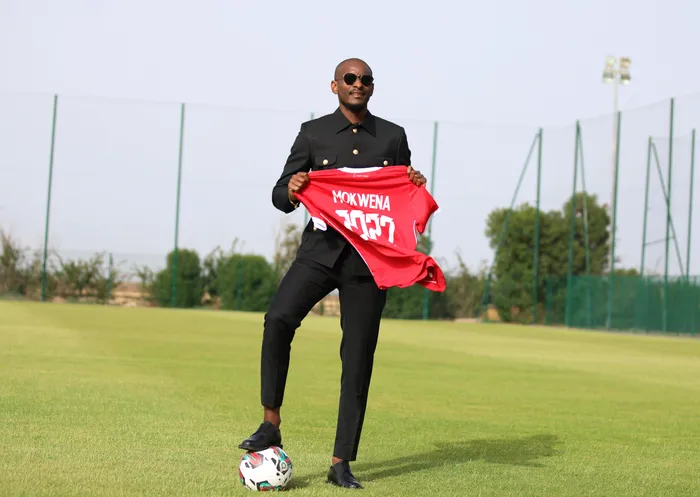Rulani Mokwena: Algeria has sharpened the young South African coach into a master
African Football

In Algeria, Rulani Mokwena has evolved from PSL wunderkind to a measured, philosophical coach, thriving in a pressure-cooker league that sharpens every facet of his footballing mind. Photo: Backpagepix
Image: Backpagepix
There is a particular calmness to Rulani Mokwena these days. Not the forced, diplomatic calm of a coach cornered by local politics or weighed down by familiar rivalries back home, but the measured serenity of a man who has finally found the kind of battlefield that sharpens his footballing sword.
Speaking from his new ‘home’ in Algeria during a Zoom engagement with the South African Football Journalists’ Association (SAFJA), one thing is clear: Rulani Mokwena is being stretched, strained, and sharpened — and he loves it.
Unlike the animated, sometimes embattled figure we knew during his time in the PSL, Algeria has introduced a version of Mokwena who sounds more monk than maverick. He speaks of the league with deep respect, citing razor-thin margins, defensive discipline, physicality, aggression, and an obsession with counter-attacking.
“The average scoreline here is 1–0,” he says, sounding almost excited by the difficulty.
To him, this is pure football academia — a laboratory where ideas must be sharpened, not just performed. Where others see defensive blocks and stubborn opponents, he sees a syllabus: the low block, the deep block, the reinforced block, and the psychological endurance required to break both the players and the shape in front of him.
In Algeria, every week is an exam — and Mokwena seems to have finally found a school worthy of his appetite.
What Mokwena is experiencing is not merely coaching. It is, by his own admission, the “hardest job” he has ever had. Not because of hostile fans or the weight of South African expectation, but because the job in Algeria is football plus politics plus logistics plus psychology.
He must manage a club president who travels with the team everywhere — “even to Libya and Cameroon,” he notes — one who carries the club in his bloodstream. He must negotiate training facilities, travel schedules, and administrative complexities that can make a CAF Champions League away trip feel like a military exercise. And yet he speaks of it all like a man relishing the adversity it brings.
Mokwena has always been a football philosopher, but Algeria has forced him to become a football manager in the truest sense. He is the meticulous planner, the emotional healer, the cultural interpreter, the multilingual communicator. The coach who must not only design training schemes but also understand the beating heart of a club he did not grow up in.
With a level of detail reminiscent of Pep Guardiola or Marcelo Bielsa, Mokwena gushes over his technical staff. He speaks fondly of Coach Wendell, the Algerian goalkeeper coach, the performance specialists, and his assistant Enzo, who brings French fluency and North African familiarity.
Mokwena’s admiration for his staff is not flattery; it is recognition. He is in a foreign land, but he has built a footballing embassy around him.
He praises his analysts for their encyclopaedic knowledge of North African football, highlights the periodization skills of his performance team, and details how Enzo bridges the gap between French-speaking and Arabic-speaking players. This is the hallmark of a man who understands that a coach’s brilliance is only as good as the people who help translate the message.
Where South Africans might expect loud proclamations ahead of a CAF Champions League return to Mamelodi Sundowns, Mokwena takes a far more sober tone. He speaks of football “heritage,” of how clubs such as Wydad needed years of heartbreak before their breakthrough.
There is no chest-thumping about beating Sundowns. No romantic return narrative. Just respect for the competition and humility about the journey.
One of the more surprising revelations is that Algerian supporters adore possession football — audibly.
“Every time we make a long sequence of passes, there’s an ‘olé, olé, olé’ from the crowd,” he says, with a fondness that borders on amusement.
This is not Egypt or Tunisia, where fans often demand directness and verticality. Algeria has embraced Mokwena’s philosophy, and that validation seems to have steadied him. South Africans often questioned whether his style was “too European,” “too romantic,” or “too theoretical.” But in Algeria, it is celebrated.
Perhaps the most striking shift is in his demeanour. Asked about Sead Ramovic — the German who was his great nemesis in the PSL — Mokwena avoids the bait completely. He has become a man uninterested in conflict.
“My bathtub is full,” he says, referencing Barack Obama’s decision to simplify life by wearing the same suits daily.
He is stripping away distractions, one by one. This is a coach no longer interested in headlines. He is interested in growth.
There is admirable honesty in how Mokwena discusses the psychological fragility of players under pressure.
“Under pressure, players fall back into old habits,” he notes. “The brain deletes new learning.”
This is not the language of a typical PSL coach. This is a man immersed in neuroscience, leadership theory, cognitive load, and human behaviour. Algeria — with its pressure-cooker atmosphere — has become his laboratory.
Rulani Mokwena has always been gifted. South Africa knew that. But perhaps he needed Algeria to become complete. In his voice — calmer, wiser, more humble — one hears a man confronting the game at the depth he always desired.
He is no longer the young coach trying to prove he belongs. He is the man who belongs — and is now proving it to himself.